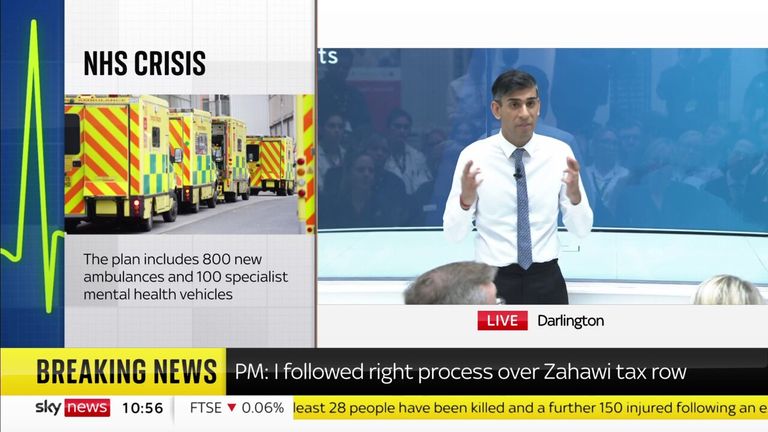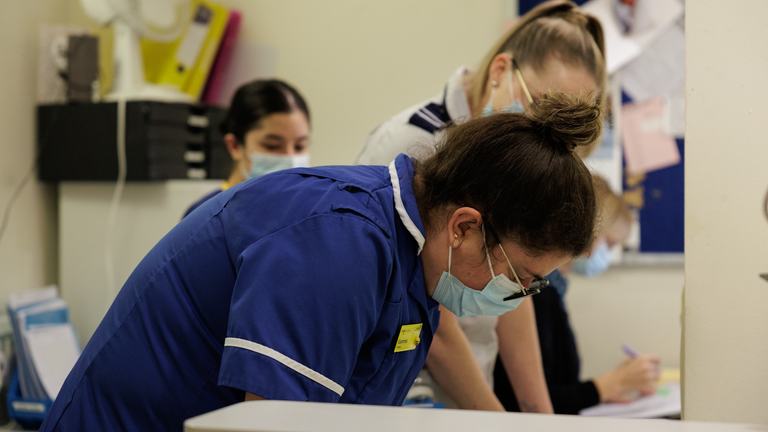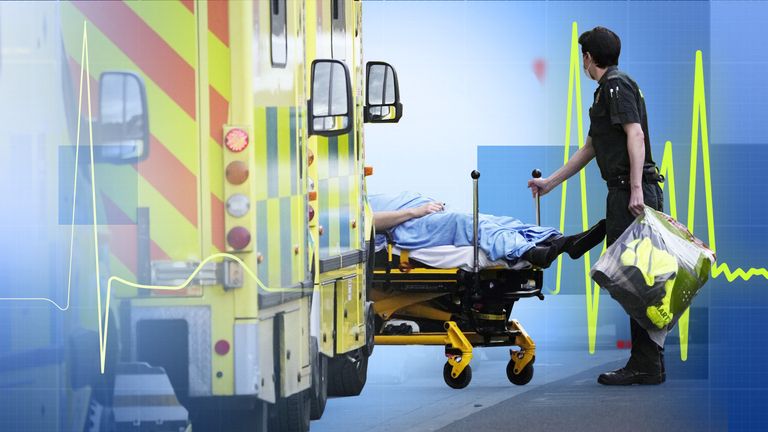Rishi Sunak claims big pay rise for nurses would lead to 'vicious cycle' of inflation as he announces plan to 'fix' emergency care
The government has continually refused to re-open negotiations when it comes to NHS staff members' pay, saying it was right to stick to the recommendation of the independent pay review body of around 4% when public finances are struggling.
Monday 30 January 2023 17:12, UK
The government has pledged thousands more hospital beds and 800 new ambulances as part of a plan to "fix" emergency care in the NHS - but Rishi Sunak is still refusing to move on nurses' pay.
The prime minister has described the proposals, which ministers hope will boost under-strain emergency care in the health service, as "ambitious and credible".
But ahead of a mass walkout of NHS staff next week, he said while he would "love" to see NHS staff paid more, he did not want to raise taxes to cover it and was trying to "get a grip" on inflation.
"I would love - nothing would give me more pleasure - than to wave a magic wand and have all of you paid lots more," Mr Sunak told health workers in County Durham.
"[But] an important part of us getting a grip of inflation and halving it is making sure the government's responsible with its borrowing, because if that gets out of control that makes it worse and it's about making pay settlements reasonable and fair.
"When we've had periods of high inflation, what happened in the past is everyone said 'okay inflation was at 15% we should all get paid 15%' and then you have a kind of vicious cycle which you never recover from."
Politics live: Ex-Tory leader rules himself out of race to replace Zahawi
Revealing the two-year plan for emergency care, the NHS and government said 800 new ambulances, including 100 specialist mental health vehicles, and 5,000 more sustainable hospital beds would be backed by a dedicated £1bn fund.
The money for this was announced in the autumn statement.
A key part of the plan is to expand urgent care in the community to keep people away from hospitals and for them to instead be treated at home.
As part of this pledge, same-day emergency care units, staffed by consultants and nurses, will open in every hospital with a major A&E department.
There are also plans for pilots of new approaches to NHS step-down care, with patients receiving rehabilitation and physiotherapy at home in some instances.
But health secretary Steve Barclay said the government would not set a target of seeing most patients within four hours as it was not achievable.
Ministers want to ensure that 76% of A&E patients are seen within four hours by next March, while category two ambulance response times - such as suspected strokes, heart attacks, burns and epilepsy - get to an average of 30 minutes over the next year.
"The impact of the pandemic has been so severe," he told the Commons. "We need to set a target that is ambitious but achievable, and that is what we have done."
However, Mr Barclay did reveal to MPs that the government would start publishing the numbers for patients who wait over 12 hours from April.
Read more:
Tearful patient voices fears for NHS
Analysis: Politicians are not offering a comprehensive solution on how to fix the health service
Other proposals in the government's plans include:
• The creation of virtual wards to see patients treated from home while monitored by medics through daily visits or video calls
• Plans to make it easier for NHS staff to move between hospitals and work in services like 111
• More options for call handlers to work from home
• Efforts to expand the number of emergency medical technicians
• Greater use of student and apprentice paramedics
• Training more staff in mental health
• An enhanced NHS 111 service including increased access to specialist paediatric advice for children and direct access to urgent mental health support
But Labour accused the government of "watering down standards for patients".
If you are an NHS worker and would like to share your experiences with us anonymously, please email NHSstories@sky.uk
At the turn of the new year, the prime minister made cutting NHS waiting times one of his five priorities.
Announcing his plan, Mr Sunak promised it would deliver "the largest and fastest-ever improvement in emergency waiting times in the NHS's history".
Speaking during a visit to County Durham, Mr Sunak added: "We're going to improve things for patients and make an enormous difference to people up and down the country."
Mr Barclay added: "Today's plan, which is backed by record investment, aims to rapidly cut waiting times, helping to deliver on one of the government's five priorities, while giving patients the confidence that health and social care services will be there for them when they need them."
The Department of Health said this weekend that 3,000 "hospital at home" beds being created before next winter.
Health minister Helen Whately told Sky News the so-called "hospital at home" beds were being well-received by the public, with the scheme allowing patients to "recover better" outside of hospital.
She said patients have shown they are "very comfortable" at conducting health appointments remotely following the COVID-19 pandemic.
Read more:
'It's a version of 1984' - NHS staff in fear of speaking out
Should you pay to see a GP?
But Shadow health secretary Wes Streeting said "patients will be waiting longer than is safe" under the plans.
"13 years of Conservative mismanagement of the NHS has left patients waiting longer than ever before for an ambulance or in A&E," he said.
"Now Rishi Sunak is watering down standards for patients. Even if the NHS achieves his targets, patients will be left waiting longer than is safe.
"Expecting the Conservatives to fix the crisis in the NHS is like expecting an arsonist to put out the fire they started, it is just not going to happen."
NHS chief executive Amanda Pritchard described the plan as "a once-in-a-generation opportunity to put the NHS on a sustainable footing".
Matthew Taylor, chief executive of the NHS Confederation, called it an "important roadmap", but warned: "Success over the next two years will not only depend on NHS staff continuing to go above and beyond, but also on concerted action to reduce the numbers of people needing to come into contact with emergency and urgent care services in the first place."
Click to subscribe to the Sky News Daily wherever you get your podcasts
The plan comes as Mr Sunak's government is locked in a bitter and ongoing dispute with nurses and ambulance workers over pay and conditions, with further walkouts planned for February.
NHS leaders are making contingency plans with the biggest walkout in the health service's history looming.
Ambulance staff and nurses are both set to go on strike on 6 February - taking industrial action on the same day for the first time ever.
Earlier this month, Mr Barclay appeared to rule out a 10% pay rise for nurses, insisting the move was "not affordable".






